Course Spotlight: Food & Art
Carmel Beer and Michal Evyatar will be co-teaching MET ML 672 Food and Art for the Spring 2023 semester.
Course Description:
Many rituals in diverse parts of the globe were created to gather people around food and eating. For example, the "Sagra" in Italy to celebrate the local seasonal yield, the Bougoule festival that celebrates the first vintage and the Jewish Passover Seder feast, to commemorate the people of Israel's journey in the desert. Food and Art is a course that explores the ingredients of food and eating "experiences'' and channels it through the five senses. In this class we will unpack personal and communal experiences through food and eating and their environments, thereby invoking both past and present. By creating immersive experiences, we aspire to deconstruct the mechanism of eating and to expose the patterns and norms involved. The course will culminate with a communal event, wherein the students will present their research outcomes and insights as installations.
The course will begin as Professor Beer and Professor Evyatar introduce the students to their own work with Mela studio where they create multi-sensory events with installations and performances that blend the culinary, performance, and visual arts.
Students will be taught to create art that is not only visible but able to touch all the senses. The five senses will be explored individually, with a few classes spent on each.
Here are a few examples of how the class will dive in:
- Sight- examine food represented in art, consider translation from a work of art to a dish, interpret paintings and translate that to something that can be consumed
- Touch- design eating tools that create a choreography with the body and the eater, consider how eating postures, textures, and temperatures impact experience
- Smell- make a smell diary as a part of a journey to focus more on this sense and develop a smell vocabulary
- Taste- view taste as a cultural detector and learn about cultures through their food with a specific focus on Israel
- Hearing- explore sound in performance pieces, hear music inspired by food, see how food varies when we hear different sounds
Class format will combine theoretical and hand-on learning as students participate, learn from each other, and get feedback in order to shape their own interpretations of the material.
The course will culminate in a public event where students will feature their own performance or installation that combines elements learned throughout the term.
There is no specific background required for the course although a fascination with food and art is recommended. Because it will be very art driven it will suit those who have a connection to visual or performance art. Students will learn to consider food as a symbol for culture, not focus on technique, restaurants, or specific dishes.
As Professor Beer put it, “The food we use exists in the art world.”
MET ML 672 Food and Art will meet in-person Tuesdays 6:00-8:45 pm for the Spring 2023 semester.
The course is open to graduate students and upper-level undergraduates who may register via the Student Link.
Non-degree seeking students can find registration information here.
Course Spotlight: Food and Gender

Dr. Megan Elias will be teaching MET ML 706, Food and Gender, in the spring 2023 semester. Here is a preview of her plans for the class:
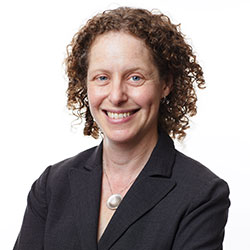
I am really excited to be teaching Food and Gender again after two years. It is my favorite class because every time I teach it I get to re-think some of our most basic assumptions about food and who we are. I see everything around me differently and students have told me that the same thing happens to them. We take an intersectional approach, so our conversations reach far into questions of identity and power.
Students assign half of our readings/viewings/activities and I have found myself watching Tamil sit coms, reading poetry about fermentation, and acting out an old family recipe, to name just a few of the student-designed assignments. We have wide ranging, challenging conversations in this class and the student projects always reflect that. I would say that of the classes I teach, it engages most with popular culture and media of the moment.
We will be reading some amazing classics, like Psyche Williams Forson’s Building Houses out of Chicken Legs, and some thrilling new work, like Diners, Dudes and Diets, by Gastronomy graduate Emily Contois, and Nurturing Masculinities, by Nefissa Naguib about food and masculinity in the Arab world. And, of course, at the end of the semester we’ll have one thought-provoking and probably also delicious thematic potluck to bring everything we have learned to the table and onto our plates.
MET ML 706, Food and Gender, will meet on Thursday evenings in the spring 2023 semester, starting on January 19. The course is open to graduate students and upper-level undergraduates. Non-degree seeking students can find registration information here.
Course Spotlight: Culinary Tourism
The Gastronomy program is thrilled to have Alicia Kennedy teaching MET ML 692 E1, Culinary Tourism for the Spring 2023 term.
This new 4-credit course is in hybrid format, combining online content with a week of in-person excursions and activities in Puerto Rico during BU’s spring break (March 5-11, 2023).
Course Description:
'Culinary Tourism', sometimes called 'Food Tourism' or 'Gastronomy Tourism' encompasses the active engagement with food and beverage experiences within a given culture or society, reflecting a sense of place, heritage, or tradition. Most often associated with international travel focusing on food, drink and tourist economies, examples of culinary tourism are increasingly found even domestically, in one's own home city or town. The idea of exploring a place for culinary purposes (eating, drinking, cooking, learning about local and regional foods) has a long history, however today the travel industry is showing record numbers with no signs of slowing. Nearly 50% of international travelers cite food and drink as the primary purpose of their journeys and the field has never offered so many options and of food and drink experiences to choose from.
From 'gourmet' chef-led tours and ultra-local street food crawls to home cooking classes, agricultural visits, and everything in between, this course will consider both the theoretical and practical aspects of culinary tourism in the 21st century. It will focus on questions around identity (food as expression), authenticity ('going to the source'), commoditization ('who gets to cook/eat what and why?') and the role of food and travel media, as well as travel industry issues such as over-tourism, environmental impact and cultural appropriation.
On top of learning the history and concepts behind culinary tourism's development, students will be taught a practical approach, looking at how the industry itself functions -- how are food and drink tours/experiences put together? Who are the industry stakeholders? What are the trends and forces driving the growing interest and what affect can this have -- both good and bad -- on local economies and cuisines?
In addition to hearing from guest speakers who are currently working in media, the class will have a workshop feel as students spend time reading, writing, and discussing work with one another. Featured here , the literature throughout the course will present a variety of valuable food studies perspectives intended to drive the conversation that the trip will then reinforce.

Students will be responsible for making and paying for their own travel and accommodation arrangements. The cost of excursions and activities are included in tuition - there is no additional fee for this course.
A course information meeting was held on 11/1/22, here you will find a link to the recording .
This class is web-reg restricted, meaning students cannot register for it via the Student Link.
If you would like to request registration please complete this form.
Please direct any further questions to Barbara Rotger (brotger@bu.edu)
Welcome new students for fall 2022, part 3
We are welcoming a bumper crop of new Gastronomy and Food Studies students for the fall semester. Enjoy getting to know a few of them here.
 Hailey DeLorey (She/Her/Hers) has always known that her passion was food. Whether it was cooking, baking, trying new restaurants, or enjoying the company of others around food, she always found the kitchen to be her happy place. Starting out as a home chef and moving into catering in college set her up to attend George Mason University where she graduated in May 2022 with a BS in Community Health specializing in Nutrition. While attending GMU, Hailey was able to explore the issues around food insecurity and how food interacts with one’s health and happiness from both a medical and cultural point of view. She hopes to further this interest at BU’s Gastronomy program by exploring more of the ways different food cultures influence people and bridge her degree in healthcare with a greater culinary knowledge.
Hailey DeLorey (She/Her/Hers) has always known that her passion was food. Whether it was cooking, baking, trying new restaurants, or enjoying the company of others around food, she always found the kitchen to be her happy place. Starting out as a home chef and moving into catering in college set her up to attend George Mason University where she graduated in May 2022 with a BS in Community Health specializing in Nutrition. While attending GMU, Hailey was able to explore the issues around food insecurity and how food interacts with one’s health and happiness from both a medical and cultural point of view. She hopes to further this interest at BU’s Gastronomy program by exploring more of the ways different food cultures influence people and bridge her degree in healthcare with a greater culinary knowledge.
Hailey currently works in food acquisition at the Greater Boston Food Bank. She recently moved to Boston where she lives with many, many roommates and is always looking for a new restaurant recommendation.
Naleen Camara (she/her) will never turn down a little treat.
In her youth, Naleen would spend summers growing tomatoes in her backyard with her father and taking trips to the wholesale warehouse to buy food in bulk for her family’s market. She’d sit knee to knee with her sisters and mother pounding, draining and mixing together ginger root to create the perfect, spicy drink for her mother’s friends at work. She’d even test out the different plants in her front yard to see which were edible (spoiler: none of them were.)
Outside of her interest in growing, making and eating food, Naleen is deeply interested in advocating for an individual’s right to a meal. After taking a food writing class during her last semester of undergrad, she began to investigate the question who gets to eat in America? The course challenged Naleen and her classmates to understand accessibility to something that should be an inherent right for everyone in the world. She also began learning about how food interacts with social constructs, analyzing how food culture intertwines with race, sex, gender, class and religion.
When Naleen doesn't have food on the mind, she’s typically listening to a podcast, going on a walk or painting.
 A Wisconsin native with a B.S. in Horticulture from the University of Nebraska- Lincoln, Christine Barta now resides in central Texas with her partner, Frank, and their 13-year-old Maltese, Oscar. She is currently the Market Garden & Retail Manager at World Hunger Relief, Inc in Waco, TX.
A Wisconsin native with a B.S. in Horticulture from the University of Nebraska- Lincoln, Christine Barta now resides in central Texas with her partner, Frank, and their 13-year-old Maltese, Oscar. She is currently the Market Garden & Retail Manager at World Hunger Relief, Inc in Waco, TX.
Having grown up in the Midwest, Christine learned pretty early on that sitting around the table was one of her favorite pastimes. The conversation never dwindled until the spread did, and even then, Midwestern goodbyes take about 200% longer than anywhere else. Gardening with her mom, hunting and fishing with her dad, and going out to eat with her sister (and sister’s friends) taught Christine a lot about what makes a good meal: the company.
While her interest specifically in Gastronomy is a bit newer, Christine can often be found reading food literature (she is currently on a Ruth Reichl kick), playing laid-back video games, or spending time with her friends and partner. She hopes that this program will allow her to not only expand her palate and knowledge, but to also become more aware on the sociocultural impact of food globally.
 Sharmila Bhide is a foodtech entrepreneur; An experimental cook; An amateur food scientist; A Michelin star frequenter; a hole-in-the-waller.
Sharmila Bhide is a foodtech entrepreneur; An experimental cook; An amateur food scientist; A Michelin star frequenter; a hole-in-the-waller.
This is how she introduces herself on her Instagram handle aptly named glutonix.
She is a CPA and an MBA from Yale and has spent the last 25 years working with numbers and finances and business. While the head was busy doing number crunching, the heart was always immersed in all aspects of food - cooking, eating, reviewing and researching.
She decided to marry her love for food and training in business to launch a successful foodtech startup. However when COVID hit, it slowed down the business and he started exploring studying in food. She has done an online course at Harvard on Science of cooking and enjoyed the class so much that she decided to go back to school to learn and research all aspects of food - history, science, anthropology, evolution etc.
She is extremely excited to begin her course at BU and be immersed fully into anything and everything about food😀
 Cooking and food has been an important part of Michael Fleming’s life from an early age. Being raised in a large family in Staten Island, NY, cooking for the masses was a weekly adventure. He has vivid memories of plating antipasto with one grandmother and watching Julia Child with another. His fondest moments growing up revolved around the table. During high school, Michael started preparing meals for family and friends and experimenting with new foods and flavors. During college, Michael realized his other passion. While working on his Associates Degree in Culinary Arts, Michael started working with children during an after school program. He transferred to Georgian Court University where he earned a Bachelor’s in Humanities with a dual certification in Elementary and Special Education. He continued and received his Master’s in Educational Leadership. For the past ten years Michael has been teaching special education at Aldrich School in Howell, New Jersey. He has maintained a plethora of food related part time jobs including working at a spice shop, a key holder at Sur La Table, a brunch chef at a boutique hotel, and a caterer.
Cooking and food has been an important part of Michael Fleming’s life from an early age. Being raised in a large family in Staten Island, NY, cooking for the masses was a weekly adventure. He has vivid memories of plating antipasto with one grandmother and watching Julia Child with another. His fondest moments growing up revolved around the table. During high school, Michael started preparing meals for family and friends and experimenting with new foods and flavors. During college, Michael realized his other passion. While working on his Associates Degree in Culinary Arts, Michael started working with children during an after school program. He transferred to Georgian Court University where he earned a Bachelor’s in Humanities with a dual certification in Elementary and Special Education. He continued and received his Master’s in Educational Leadership. For the past ten years Michael has been teaching special education at Aldrich School in Howell, New Jersey. He has maintained a plethora of food related part time jobs including working at a spice shop, a key holder at Sur La Table, a brunch chef at a boutique hotel, and a caterer.
An avid traveler, Michael enjoys experiencing the world through cuisine. Having visited over 30 countries, Michael has taken a cooking class or food tour in nearly all of them. He finds pleasure in bringing new ingredients, techniques, and recipes home and trying them out on family and friends. During the pandemic, Michael became really interested in cooking, recipe development, and food history. He scoured cookbooks and prepared a new recipe nightly for his two roommates, teaching both how to cook (and wash the dishes!) Currently, Michael is beginning his eleventh year teaching language and learning disabled students and working part time for a cinema start-up called Cinema Lab at his local cinema. Michael resides in Bradley Beach, New Jersey.
 Born and raised in Atlanta, GA, Amy Phuong grew up watching Yan Can Cook on PBS while doing her homework as her parents worked late. She developed a love of food getting homecooked meals every day from her mom and going grocery shopping as a typical weekend activity. Her first memory of when she realized her food was culturally different was one day, in grade school, Amy came home to ask her mom to get a McDonald’s hamburger like all the other kids. On modest means, her mom told Amy she would send her a homecooked hamburger as her school lunch that week. Amy was excited about getting a hamburger for lunch – only to find a cold, fried pork chop sandwiched between two slices of white bread as her ‘hamburger’. She didn’t have the heart to explain to her mom that wasn’t what she wanted.
Born and raised in Atlanta, GA, Amy Phuong grew up watching Yan Can Cook on PBS while doing her homework as her parents worked late. She developed a love of food getting homecooked meals every day from her mom and going grocery shopping as a typical weekend activity. Her first memory of when she realized her food was culturally different was one day, in grade school, Amy came home to ask her mom to get a McDonald’s hamburger like all the other kids. On modest means, her mom told Amy she would send her a homecooked hamburger as her school lunch that week. Amy was excited about getting a hamburger for lunch – only to find a cold, fried pork chop sandwiched between two slices of white bread as her ‘hamburger’. She didn’t have the heart to explain to her mom that wasn’t what she wanted.
 From Geologist to Full-time Mom to Personal Chef, Jessica Wilson is an avid believer in the mantra “Never Stop Learning”. She loved her 14 years as a Geologist in the Energy Industry where she was able to work collaboratively with multi-functional teams both domestically and internationally in addressing challenging, time-sensitive scientific and operational problems, as well as personal topics with fellow geologists via management and staffing and development. However, while there, she began to realize just how many people, often with dual career families, work hard every day only to come home in the evening exhausted and unable to find the time to cook. Jessica truly believes in the health and wellness benefits that a good, clean, home-cooked meal provides, and that, coupled with her frustration at not being able to indulge in her passion for cooking as much as she would have liked, led her to make the decision to pivot onto a new culinary path. After earning a Diploma in Culinary Arts, she worked as a personal chef, serving seniors in her community. She is also a certified Culinary Coach via the CHEF (Culinary Health Education Fundamentals) training program offered by the Institute of Lifestyle Medicine. Throughout her life, Jessica has been grateful for her ability to enjoy a deep-rooted connection to the land as she continues to work with her father and their farmer-business partners to continue their 100+ year family legacy of farming corn and soybeans in Cumberland County Illinois. Jessica currently lives in Texas and misses the East Coast. For fun, she enjoys reading, cooking, practicing food photography, teaching her sons to cook and eating the cupcakes her son Patrick loves to make. She is also always up for a glass of cabernet sauvignon and dark chocolate.
From Geologist to Full-time Mom to Personal Chef, Jessica Wilson is an avid believer in the mantra “Never Stop Learning”. She loved her 14 years as a Geologist in the Energy Industry where she was able to work collaboratively with multi-functional teams both domestically and internationally in addressing challenging, time-sensitive scientific and operational problems, as well as personal topics with fellow geologists via management and staffing and development. However, while there, she began to realize just how many people, often with dual career families, work hard every day only to come home in the evening exhausted and unable to find the time to cook. Jessica truly believes in the health and wellness benefits that a good, clean, home-cooked meal provides, and that, coupled with her frustration at not being able to indulge in her passion for cooking as much as she would have liked, led her to make the decision to pivot onto a new culinary path. After earning a Diploma in Culinary Arts, she worked as a personal chef, serving seniors in her community. She is also a certified Culinary Coach via the CHEF (Culinary Health Education Fundamentals) training program offered by the Institute of Lifestyle Medicine. Throughout her life, Jessica has been grateful for her ability to enjoy a deep-rooted connection to the land as she continues to work with her father and their farmer-business partners to continue their 100+ year family legacy of farming corn and soybeans in Cumberland County Illinois. Jessica currently lives in Texas and misses the East Coast. For fun, she enjoys reading, cooking, practicing food photography, teaching her sons to cook and eating the cupcakes her son Patrick loves to make. She is also always up for a glass of cabernet sauvignon and dark chocolate.
Fall 2022 Pépin Lecture Series in Food Studies & Gastronomy
Fall 2022 lectures will be presented both in-person and via webinar format. Registration is free and open to the public – please follow the link for each program to register.
SEPTEMBER

Food Instagram: Identity, Influence, and Negotiation
with Emily Contois, KC Hysmith, and Zenia Kish
Zoom Webinar: participants will be sent link one day prior to the lecture.
Image by image and hashtag by hashtag, Instagram has redefined the ways we relate to food. Emily J. H. Contois and Zenia Kish edit contributions that explore the massively popular social media platform as a space for self-identification, influence, transformation, and resistance. Artists and journalists join a wide range of scholars to look at food’s connection to Instagram from vantage points as diverse as Hong Kong’s camera-centric foodie culture, the platform’s long history with feminist eateries, and the photography of Australia’s livestock producers. What emerges is a portrait of an arena where people do more than build identities and influence. Users negotiate cultural, social, and economic practices in a place that, for all its democratic potential, reinforces entrenched dynamics of power.
Interdisciplinary in approach and transnational in scope, Food Instagram offers general readers and experts alike new perspectives on an important social media space and its impact on a fundamental area of our lives.
Emily J.H. Contois is Assistant Professor of Media Studies, University of Tulsa
KC Hysmith is a PhD Candidate in American Studies at the University of North Carolina
Zenia Kish is Assistant Professor Media Studies, University of Tulsa
*Save 30% on Food Instagram by ordering from University of Illinois Press with code S22UIP
Fri, September 23, 2022
12:00 PM – 1:00 PM EDT
OCTOBER

Getting Something to Eat in Jackson
with Joseph C. Ewoodzie Jr.
In person plus Zoom webinar: webinar participants will be sent link one day prior to the lecture.
Getting Something to Eat in Jackson uses food—what people eat and how—to explore the interaction of race and class in the lives of African Americans in the contemporary urban South. Joseph Ewoodzie Jr. examines how “foodways”—food availability, choice, and consumption—vary greatly between classes of African Americans in Jackson, Mississippi, and how this reflects and shapes their very different experiences of a shared racial identity.
Ewoodzie spent more than a year following a group of socioeconomically diverse African Americans—from upper-middle-class patrons of the city’s fine-dining restaurants to men experiencing homelessness who must organize their days around the schedules of soup kitchens. Ewoodzie goes food shopping, cooks, and eats with a young mother living in poverty and a grandmother working two jobs. He works in a Black-owned BBQ restaurant, and he meets a man who decides to become a vegan for health reasons but who must drive across town to get tofu and quinoa. Ewoodzie also learns about how soul food is changing and why it is no longer a staple survival food. Throughout, he shows how food choices influence, and are influenced by, the racial and class identities of Black Jacksonians.
By tracing these contemporary African American foodways, Getting Something to Eat in Jackson offers new insights into the lives of Black Southerners and helps challenge the persistent homogenization of blackness in American life.
Joseph C. Ewoodzie Jr. is associate professor of sociology at Davidson College. He is the author of Break Beats in the Bronx: Rediscovering Hip-Hop’s Early Years. He lives in Charlotte, North Carolina. Twitter @piko_e
Thu, October 13, 2022
6:00 PM – 7:00 PM EDT
Location:
Boston University College of Arts and Science, Room 211
685 - 725 Commonwealth Avenue
Boston, MA 02215
____________________________

Feeding Fascism: The Politics of Women's Food Work
with Diana Garvin
In person plus Zoom webinar: webinar participants will be sent link one day prior to the lecture.
Feeding Fascism explores how women negotiated the politics of Italy’s Fascist regime in their daily lives and how they fed their families through agricultural and industrial labor. The book looks at women’s experiences of Fascism by examining the material world in which they lived in relation to their thoughts, feelings, and actions.
Over the past decade, Diana Garvin has conducted extensive research in Italian museums, libraries, and archives. Feeding Fascism includes illustrations of rare cookbooks, kitchen utensils, cafeteria plans, and culinary propaganda to connect women’s political beliefs with the places that they lived and worked and the objects that they owned and borrowed. Garvin draws on first-hand accounts, such as diaries, work songs, and drawings, that demonstrate how women and the Fascist state vied for control over national diet across many manifestations – cooking, feeding, and eating – to assert and negotiate their authority. Revealing the national stakes of daily choices, and the fine line between resistance and consent, Feeding Fascism attests to the power of food.
Diana Garvin is Assistant Professor of Italian with a focus on Mediterranean Studies at the University of Oregon.
Wed, October 26, 2022
6:00 PM – 7:00 PM EDT
Location:
Groce Pépin Culinary Innovation Laboratory
808 Commonwealth Avenue, Room 124
Boston, MA 02215
NOVEMBER

Food in Memory and Imagination: Space, Place, and Taste
with Beth Forrest and Greg de St. Maurice
In person plus Zoom webinar: webinar participants will be sent link one day prior to the lecture.
Editors Beth M. Forrest, Professor of Liberal Arts at the Culinary Institute of America, and Greg de St. Maurice, Assistant Professor at Keio University, Japan will discuss the recently published volume Food in Memory and Imagination: Space, Place and, Taste.
How do we engage with food through memory and imagination? This expansive volume spans time and space to illustrate how, through food, people have engaged with the past, the future, and their alternative presents.
Beth M. Forrest and Greg de St. Maurice have brought together first-class contributions, from both established and up-and-coming scholars, to consider how imagination and memory intertwine and sometimes diverge. Chapters draw on cases around the world-including Iran, Italy, Japan, Kenya, and the US-and include topics such as national identity, food insecurity, and the phenomenon of knowledge. Contributions represent a range of disciplines, including anthropology, history, philosophy, psychology, and sociology. This volume is a veritable feast for the contemporary food studies scholar.
Fri, November 18, 2022
12:00 PM – 1:00 PM EST
Location:
Groce Pépin Culinary Innovation Laboratory
Boston University Gastronomy Program
808 Commonwealth Avenue, Room 124
Boston, MA 02215
We thank the Jacques Pépin Foundation for sponsorship of this lecture series.
Welcome new students for fall 2022, part 2
We are welcoming a bumper crop of new Gastronomy and Food Studies students for the fall semester. Enjoy getting to know a few of them here.
 Tracey Torres (she/her) grew up with a great appreciation for food. She was born and raised in the south suburbs of Chicago. As a child of Filipino immigrants, she was lucky to grow up eating home-cooked dishes almost every night. As years went on, a new dish would be added to the table like pasta with fresh tomatoes and basil after a neighbor brought it to a family party. The basil then would find itself in a Thai-inspired stir fry because her mom wanted to replicate their favorite takeout place. Tracey would continue to learn about food through dinner time with her family and by watching numerous episodes of Two Fat Lady’s, Yan Can Cook and of course, Jacques & Julia: Cooking at Home on PBS. Her interest in food followed her to the University of Iowa. However, she found herself spending more time in the public library reading cookbooks instead of attending class. She then transferred to Kendall College and graduated with a B.A. in Culinary Arts. During her undergrad, Tracey worked in many areas of the food world. She spent summers working at the farmers’ market, catered some wild gigs, and flipped burgers on the lake at a yacht club. However, the path she would take after graduation was cooking in Michelin-starred restaurants in Chicago and New York City.
Tracey Torres (she/her) grew up with a great appreciation for food. She was born and raised in the south suburbs of Chicago. As a child of Filipino immigrants, she was lucky to grow up eating home-cooked dishes almost every night. As years went on, a new dish would be added to the table like pasta with fresh tomatoes and basil after a neighbor brought it to a family party. The basil then would find itself in a Thai-inspired stir fry because her mom wanted to replicate their favorite takeout place. Tracey would continue to learn about food through dinner time with her family and by watching numerous episodes of Two Fat Lady’s, Yan Can Cook and of course, Jacques & Julia: Cooking at Home on PBS. Her interest in food followed her to the University of Iowa. However, she found herself spending more time in the public library reading cookbooks instead of attending class. She then transferred to Kendall College and graduated with a B.A. in Culinary Arts. During her undergrad, Tracey worked in many areas of the food world. She spent summers working at the farmers’ market, catered some wild gigs, and flipped burgers on the lake at a yacht club. However, the path she would take after graduation was cooking in Michelin-starred restaurants in Chicago and New York City.
After spending 12 years in professional kitchens, Tracey decided to pivot to the corporate world after having her son. Restaurant life with a young child was as hard as it may seem. She is currently working as a Culinary Specialist at a large CPG company, enjoying the product innovation process while also sneaking in some recipe development. She is so excited to join the BU Gastronomy community and continue learning and growing in the Culinary world.
 Alison Barricklow ’s primary love language has always been food. She learned to love cooking, baking, and the joy of sharing a meal with others when she was a child, and her passion ultimately led her to a career in the hospitality industry. She began working in restaurant kitchens when she was a teenager, and moved on to roles in catering, meeting and event management, and food and wine travel as her career progressed. Her most recent position was as a Tour and Travel Director for an international wine distributor where she planned and managed small group food and wine tours in Europe.
Alison Barricklow ’s primary love language has always been food. She learned to love cooking, baking, and the joy of sharing a meal with others when she was a child, and her passion ultimately led her to a career in the hospitality industry. She began working in restaurant kitchens when she was a teenager, and moved on to roles in catering, meeting and event management, and food and wine travel as her career progressed. Her most recent position was as a Tour and Travel Director for an international wine distributor where she planned and managed small group food and wine tours in Europe.
Alison attended Wheaton College in Norton, MA in the mid 80’s, but had to leave before graduating. She was finally able to take a career break in 2019 to complete her degree and graduated Southern New Hampshire University in March 2020, just as the pandemic lockdown began. Unfortunately, she has been unable to move forward in her career since then, which is why she decided on the Gastronomy program. She has ideas for a culinary travel business but wants to stay open for now to see where this experience could potentially lead her.
When Alison and her husband became empty nesters, they relocated to Los Angeles from New Hampshire, so she is participating as an online student. She loves the California weather most of the year, but misses fall in New England, especially when it comes to apple picking, fresh apple cider, and hot apple cider donuts! She hopes to attend class in person one fall term so she can satisfy her food cravings.
In her free time, Alison loves to travel, explore food markets, go wine tasting, take food tours, visit museums, hike, read, take way too many photos, and spend time with her husband and children.
 Isabella Pedroli Giordano was born and raised in Los Angeles, California and spent fifteen years cooking professionally. A self-proclaimed Italophile, she honed her craft in Italian kitchens in California, the Republic of San Marino, and Italy. She apprenticed in San Marino, Le Marche and Emilia-Romagna during various points of her career. A perpetual student, she returned to community college in 2017, eventually transferring to the University of California, Davis. There, she majored in Spanish and minored in Italian. Ultimately, her goal is to bridge her culinary knowledge with literature and language, to comprehend the nuances of the origin and history of food. In understanding how and why food or a dish are part of a specific culture, Isabella hopes to better communicate and tell stories about a given culture. She also believes that good food should be accessible to all, regardless of their socioeconomic background. Through the pursuit of formal education, Isabella would like to reach a broader audience in her future career. She envisions teaching at the community college level or in a community-based setting, working towards making wholesome and home-cooked food accessible and manageable for underserved communities. She would like to use her knowledge of Spanish to reach Spanish-speaking communities and people of color.
Isabella Pedroli Giordano was born and raised in Los Angeles, California and spent fifteen years cooking professionally. A self-proclaimed Italophile, she honed her craft in Italian kitchens in California, the Republic of San Marino, and Italy. She apprenticed in San Marino, Le Marche and Emilia-Romagna during various points of her career. A perpetual student, she returned to community college in 2017, eventually transferring to the University of California, Davis. There, she majored in Spanish and minored in Italian. Ultimately, her goal is to bridge her culinary knowledge with literature and language, to comprehend the nuances of the origin and history of food. In understanding how and why food or a dish are part of a specific culture, Isabella hopes to better communicate and tell stories about a given culture. She also believes that good food should be accessible to all, regardless of their socioeconomic background. Through the pursuit of formal education, Isabella would like to reach a broader audience in her future career. She envisions teaching at the community college level or in a community-based setting, working towards making wholesome and home-cooked food accessible and manageable for underserved communities. She would like to use her knowledge of Spanish to reach Spanish-speaking communities and people of color.
Isabella currently resides in Urbana, Illinois with her partner, Brian, who is a graduate student at the University of Illinois at Urbana-Champaign.
 Isabel Marie Barbosa, whose pronouns are she/they, has always recognized food as a connective component of the human experience. Growing up in Southern California, they regularly threw elaborate dinner parties, cooking for and with friends, and were known to show up to school with sweets to share. Over the years, they have observed the way food, and our relation to it, has been a tool to connect with, or distance ourselves from, community.
Isabel Marie Barbosa, whose pronouns are she/they, has always recognized food as a connective component of the human experience. Growing up in Southern California, they regularly threw elaborate dinner parties, cooking for and with friends, and were known to show up to school with sweets to share. Over the years, they have observed the way food, and our relation to it, has been a tool to connect with, or distance ourselves from, community.
Isabel’s career path has taken them through the theatrical, philosophical, and archaeological fields, each of which has informed their approach to gastronomy. Not only have they developed a curiosity about the role of food in the arts and recognized its ability to connect us with other cultures, both past and present; they have also come to view food as the lens through which philosophy can be grounded in the human experience.
The intersection of their lived experience and academic interest has led Isabel to pursue a Masters in Gastronomy at Boston University, where they hope to explore the juncture of food, philosophy, and queerness. They are also compelled by food as art, both historical and contemporary; something they hope to study by pairing academic examination and practical application.
Isabel is currently living in Brooklyn, where they are cultivating their culinary curiosity both inside and outside of the kitchen. They spend their time exploring the many facets of the New York food scene, frequenting food festivals, popups, museum exhibitions, and community events.
Welcome new students, Fall 2022
We are welcoming a bumper crop of new Gastronomy and Food Studies students for the fall semester. Enjoy getting to know a few of them here.
 Andrea Catania was born, bred, and buttered in the Syracuse, New York area. From a young age she witnessed the influence of food in small moments. Then, as she grew, gained a deeper understanding of food's power to connect us on a larger scale. Andrea decided to attend college at The Culinary Institute of America in the beautiful Hudson Valley region. Upon graduation she spent the next decade focused on her career, working across several facets of the Food and Beverage industry in Los Angeles, Las Vegas, and most recently Denver.
Andrea Catania was born, bred, and buttered in the Syracuse, New York area. From a young age she witnessed the influence of food in small moments. Then, as she grew, gained a deeper understanding of food's power to connect us on a larger scale. Andrea decided to attend college at The Culinary Institute of America in the beautiful Hudson Valley region. Upon graduation she spent the next decade focused on her career, working across several facets of the Food and Beverage industry in Los Angeles, Las Vegas, and most recently Denver.
She is passionate about food justice and has had the opportunity to volunteer with multiple organizations that support food sovereignty and anti-hunger initiatives.
Forever a student of wine, Andrea has a black cat named Gaja (after her favorite Italian producer). When she's not busy spotting fellow left-handers in TV and movies, she can likely be found hiking, listening to podcasts about culinary history, or trying regional dishes throughout her travels.
Being a part of the Gastronomy program at BU has been a dream of hers for more than ten years so she is thrilled to begin this next chapter. She intends to put her future degree to use by contributing to positive societal change in the field of food.
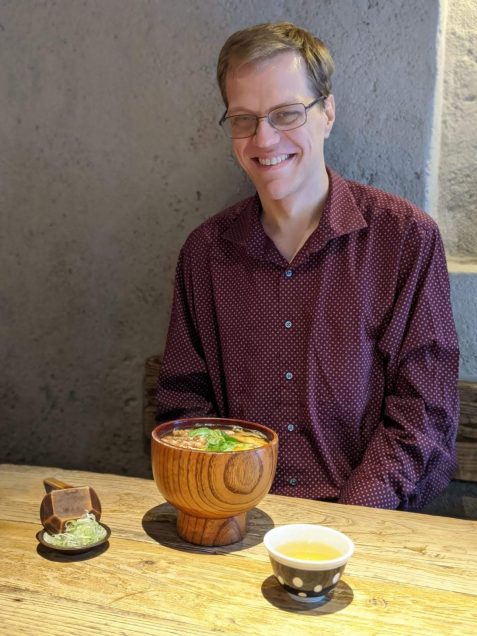 Adam Engstrom‘s grandmother was a depression era assistant pastry chef at a school and was quite accomplished in the kitchen by all accounts. Unfortunately, she passed away while he was only three – far too young to benefit from her tutelage in the kitchen; however, despite that, he strongly believes that she still managed to embune some of her culinary magic into the family. This magic filtered down to him and kindled a passion for food and the culinary arts, and he feels like he summons some of it whenever he uses some of her old bakeware. Outside the kitchen, he is constantly seeking out novel cultural culinary experiences, reading about the history of foods and foodways, collecting more cookbooks and recipes than he could realistically get through in a lifetime, and researching his family’s culinary history.
Adam Engstrom‘s grandmother was a depression era assistant pastry chef at a school and was quite accomplished in the kitchen by all accounts. Unfortunately, she passed away while he was only three – far too young to benefit from her tutelage in the kitchen; however, despite that, he strongly believes that she still managed to embune some of her culinary magic into the family. This magic filtered down to him and kindled a passion for food and the culinary arts, and he feels like he summons some of it whenever he uses some of her old bakeware. Outside the kitchen, he is constantly seeking out novel cultural culinary experiences, reading about the history of foods and foodways, collecting more cookbooks and recipes than he could realistically get through in a lifetime, and researching his family’s culinary history.
He has only recently discovered the field of gastronomy studies but feels that it dovetails perfectly into the passion he inherited from his grandmother, his previous master’s degrees in social and cultural psychology and information studies, and his professional work as a user experience researcher and designer. He dreams about traveling the world and immersing himself in the foods and culinary traditions of other cultures like Rick Steves or Michael Pollan. With his love of cooking and baking, expertise in social and cultural psychology, and appreciation of how design shapes experiences, pursuing a career path that blended food and culture feels that it would allow him to indulge his passions and also play to his strengths.
 Sophie Landa (She/Her) has been in love with food from the moment she arrived into this world. No matter what would be going on, Sophie was happiest with a snack in her hand and friends/ family to share it with. After watching an episode of Anthony Bourdain’s No Reservations that took place in Osaka Japan, Sophie’s interest in Japanese food and culture was sparked and culminated in a college graduation trip to Japan in 2019. That incredible trip completely changed her life and she began taking steps to attempt to live in Japan. That was when the pandemic hit. As life came to a halt, Sophie once again found herself watching travel and food shows. She became particularly fascinated by the Netflix show Taco Chronicles, especially during the portions where they would discuss the history behind a particular dish. This sudden fascination with the history of recipes caused a spark to light in her, and she began to ruminate on what she wanted to do in the future. After a year of careful deliberation, Sophie decided to apply for the Boston University Food Studies Graduate Certificate Program. Sophie is delighted to be a part of this exciting community, and is hoping to use her interest (and degree from Bard College) in theater and performance to help share the stories and experiences of those who create and enjoy food.
Sophie Landa (She/Her) has been in love with food from the moment she arrived into this world. No matter what would be going on, Sophie was happiest with a snack in her hand and friends/ family to share it with. After watching an episode of Anthony Bourdain’s No Reservations that took place in Osaka Japan, Sophie’s interest in Japanese food and culture was sparked and culminated in a college graduation trip to Japan in 2019. That incredible trip completely changed her life and she began taking steps to attempt to live in Japan. That was when the pandemic hit. As life came to a halt, Sophie once again found herself watching travel and food shows. She became particularly fascinated by the Netflix show Taco Chronicles, especially during the portions where they would discuss the history behind a particular dish. This sudden fascination with the history of recipes caused a spark to light in her, and she began to ruminate on what she wanted to do in the future. After a year of careful deliberation, Sophie decided to apply for the Boston University Food Studies Graduate Certificate Program. Sophie is delighted to be a part of this exciting community, and is hoping to use her interest (and degree from Bard College) in theater and performance to help share the stories and experiences of those who create and enjoy food.
Sophie is currently living in Pittsfield Massachusetts with her toy poodle Leo. When she’s not being a pillow for her dog, she spends her time listening to podcasts, playing video games, and trying new recipes.
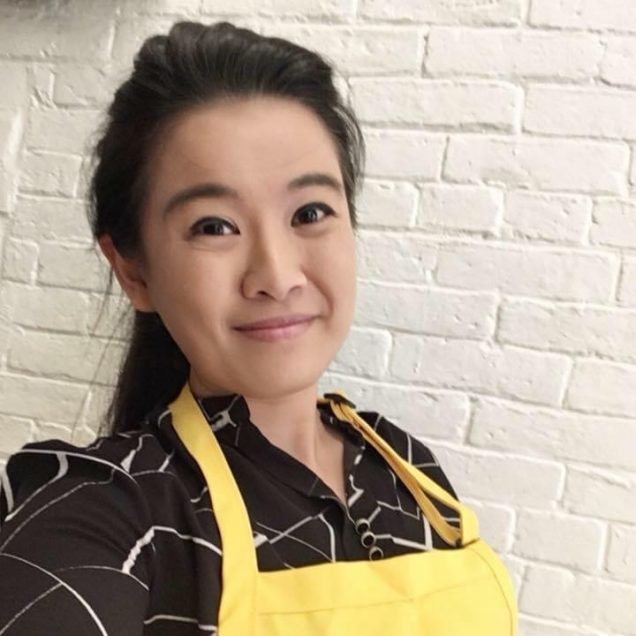 Ploy Khunisorn is passionate about food, education, entrepreneurship, equity, and sustainability. Ploy is a native of Thailand. She went to Suan Dusit International Culinary School while she was working as a financial analyst in Bangkok. In 2012, she came to the USA to do a master’s degree in Sustainability at Harvard University and a master’s degree in Education at Cambridge College.
Ploy Khunisorn is passionate about food, education, entrepreneurship, equity, and sustainability. Ploy is a native of Thailand. She went to Suan Dusit International Culinary School while she was working as a financial analyst in Bangkok. In 2012, she came to the USA to do a master’s degree in Sustainability at Harvard University and a master’s degree in Education at Cambridge College.
She currently works full-time as the Director of Educational Programs at CommonWealth Kitchen, a food incubator kitchen in Boston. She is also a part-time culinary instructor for Cambridge Center for Adult Education and runs her own online cooking school, Ploy’s Kitchen. Before she came to work for CommonWealth Kitchen, she had worked full time for Cambridge Center for Adult Education as the Program Director for Food & Wine and Business & Technology department for 7 years.
She truly believes in continuing education. Through the Master of Arts in Gastronomy at Boston University, she hopes to deepen and explore the holistic approach of understanding fundamental food issues and hope to find a new research technique for practical implementation. She believes that we can transform the local food economy through diverse local food businesses.
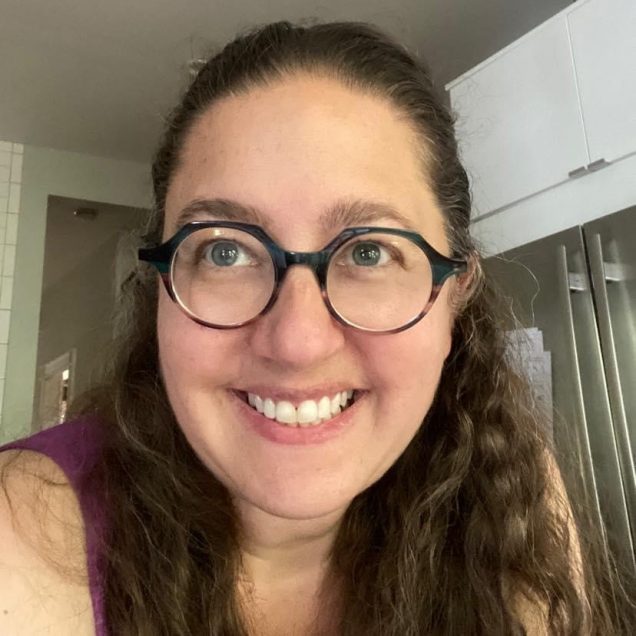 Erica Lewy has always been creative. Her middle school idea of an exciting New Year’s Eve was preparing a lavish feast from the Silver Palate Cookbook, complete with fruit-stuffed Cornish hens, so it was probably inevitable she ended up here. She earned her undergraduate degree from RISD in painting and has spent over fifteen years working as a marketing professional in higher education. For her, food brings to mind family, traditions, and memories. She is interested in exploring how and why food is so evocative, how food plays a role in forming traditions, and how changing societal dietary restrictions affect those traditions and memories. When she is not at work, she is usually in her kitchen; or out walking the trails of New England.
Erica Lewy has always been creative. Her middle school idea of an exciting New Year’s Eve was preparing a lavish feast from the Silver Palate Cookbook, complete with fruit-stuffed Cornish hens, so it was probably inevitable she ended up here. She earned her undergraduate degree from RISD in painting and has spent over fifteen years working as a marketing professional in higher education. For her, food brings to mind family, traditions, and memories. She is interested in exploring how and why food is so evocative, how food plays a role in forming traditions, and how changing societal dietary restrictions affect those traditions and memories. When she is not at work, she is usually in her kitchen; or out walking the trails of New England.
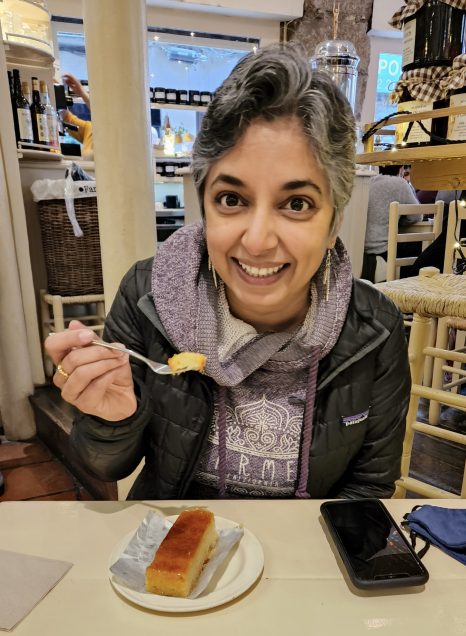 Born and raised in India, Surabhi Supekar now calls the United States her home. Completing her Master’s in Industrial/Organizational Psychology, she has been a process improvement and project management professional for over a decade.
Born and raised in India, Surabhi Supekar now calls the United States her home. Completing her Master’s in Industrial/Organizational Psychology, she has been a process improvement and project management professional for over a decade.
To Surabhi, food always meant comfort and nourishment, whether as a child in her grandmother’s and mother’s kitchen or as an adult, providing the same sustenance for her family.
Despite a successful and demanding career in corporate healthcare, she spends her spare time pouring over various food-related books and articles. Like many others, she found herself reflecting and contemplating life’s choices during the recent pandemic lockdown. As anybody who has been down the road of what they want to do with their life mid-career can attest to, it is at times fraught with uncertainty and misgivings.
After taking a food writing course one summer on a whim, it was as if that fog of uncertainty had suddenly lifted; food writing allowed her to experience her interest in food beyond reading books and articles. And now, being part of BU’s Gastronomy program, the jigsaw puzzle of “what’s next” has started to piece itself together, allowing her to learn from and grow alongside fellow food enthusiasts and professionals, embarking on a more meaningful and rewarding journey.
Recipes for Accessibility Recap
In spring 2022, the Gastronomy Program presented a three part event, Recipes for Accessibility, as part of the Boston University Diversity and Inclusion Learn More series and sponsored by BU D&I. The goal of this series was to highlight the culinary prowess and experiences of disabled chefs, while also sparking conversations and a deeper understanding of how ableism, as well as adaptability, function in food spaces. This blog post features the recordings of the three virtual events, which included two cooking demos and one roundtable featuring disabled folks and allies.
Cooking Demonstrations: Every day, people with disabilities prepare delicious, nourishing food for themselves and others—yet food media hardly ever portray the disabled cook. In these virtual events, Alexis Hillyard, creator of Stump Kitchen, and Brian Charlson, former Director of Technology at the Carroll Center for the Blind each demonstrated a recipe that is important to them, and spoke about their culinary approaches. This event aims to celebrate the skills and experiences of disabled cooks, while also cultivating an understanding of how ableism and adaptability function in food spaces.
Cooking Demo with Alexis Hillyard, creator of Stump Kitchen
Alexis Hillyard (she/her) is a queer and disabled YouTube Creator, self-taught vegan chef, and entrepreneur. Born without her left hand, Alexis uses her stump as a kitchen tool - from spatula to juicer - while expanding the vocabulary of what's possible in the kitchen each week on her YouTube show ‘Stump Kitchen.’ Stump Kitchen is a YouTube series that celebrates body diversity, gluten free vegan cooking, and the amazing, unique ways we move through the world. In 2016 & 2018, Stump Kitchen won Best Food Blog in VUE Magazine’s Best of Edmonton, Canada. In 2017 Alexis was named the first Canadian Ambassador to the Lucky Fin Project, an organization dedicated to limb difference awareness, education, and celebration. Alexis was also awarded the Meritorious Service Medal from the Governor General of Canada for her Stump Kitchen work, which is one of the highest honours that Canada can bestow on its citizens.
Cooking Demo with Brian Charlson, former Director of Technology at the Carroll Center for the Blind
While living in Salem Oregon in the early 80s, Brian Charlson owned and operated “Brian’s Place”, a 52 seat cafeteria in a state office building. While he enjoyed the work, he didn’t enjoy the pay and moved on to work for the Oregon State Senate as the Sargent at Arms. After moving to Massachusetts, Brian Charlson was the Director of Technology at the Carroll Center for the Blind where he directed their Technology Training Programs both on CCB’s campus and in the community. In addition to overseeing the agencies general technology needs, he also oversaw the Accessibility Services program wherein a team of highly qualified user testers and web developers work with for-profit, non-profit and governmental companies and organizations to be sure that their web sites and services are fully accessible for blind and visually impaired users.
Brian has presented on adaptive technology subjects at numerous local, national and International conferences. He has also worked with such companies as Apple, Microsoft, Google, Facebook, Comcast and Yahoo to improve the accessibility of their products and services.
His love for cooking became an at-home activity where he cooks for family and bakes for charities. His last bake of cookies sold for $360, $10.00 a cookie.
He is now remodeling a “just for fun” kitchen in his basement where he intends to host a podcast for those who cannot use their vision to cook, tentatively titled “Brian’s Man Cave Kitchen”.
Recipes for Accessibility: Roundtable Discussion
How can we create more accessible, inclusive kitchens, recipes, food media, and more? In this virtual roundtable, Tracy Williams, nutrition advocate, Shaun Chavis founder of LVNGbook, Jonathan Katz author of Flavors of Diaspora blog, and Kristie Cabrera, occupational therapist & urban farmer reimagine a food world without ableism.
Meet the Roundtable Speakers:
Tracy Williams (she/her) earned her degree in Nutrition and Dietetics from Dominican University. She loves to promote appropriate nutrition choices for the general population as well as peers with various disabilities. She has been a nutrition presenter for Abilities Expo Chicago focusing on adaptive cooking, meal planning, healthy lifestyle goals as well as mental health. She enjoys freelance writing, especially in Push Living, Abilities Buzz, and Disability Horizons. She served as a consultant with Food Dignity to create educational modules related to mental health and disability for their partner organizations as well as other projects.
Shaun Chavis (she/her) is a food and health journalist and entrepreneur in Atlanta, Georgia. She is currently managing editor of Found, a health startup that offers weight care. Shaun also owns LVNGbook, a company that licenses healthy recipes. LVNGbook is part of the AgeTech Collaborative by AARP, and an AARP Innovation Labs Portfolio Company. Shaun has worked or written for Serious Eats, Time Inc. Books, Real Simple, Health, Sharecare, How Stuff Works, AllRecipes, SouthernLiving.com, and CookingLight.com. She's passionate about addressing inequities in nutrition and dietetics and creating dietary advice that reflects America's increasingly diverse population.
Jonathan Katz (he/his) is an autistic food blogger in the Washington DC area. He writes Flavors of Diaspora, a mostly Jewish history-themed food and cooking blog. He has also written about food for In Defense of Processed Food, Roads and Kingdoms, Jewish Currents, and the Jewish Daily Forward. He has written extensively about disability and neurodivergence in the kitchen. In his day job, he works for the US Department of Labor. This panel is completely separate from his employment.
Kristie Cabrera (she/her) is a neurodiverse, queer, and Latinx occupational therapist and urban farmer. Kristie is passionate about making nature spaces more accessible and inclusive for disabled and neurodiverse folx. Kristie hopes to collaborate with those who work on the land to unpack their own ableism and views of their body/mind, understand accessibility better, and identify ways to improve their site’s accessibility, inclusivity, and work culture. Kristie also has experience working in the food industry, particularly with creating inclusive culinary experiences. Kristie is currently raising funds and gathering resources so that she can one day start an educational and healing nature space that is designed through the lens of accessibility and inclusivity. She hopes this space can serve as a model for others.
Fall 2022 Course Spotlight: Indigenous Food Cultures and Communities
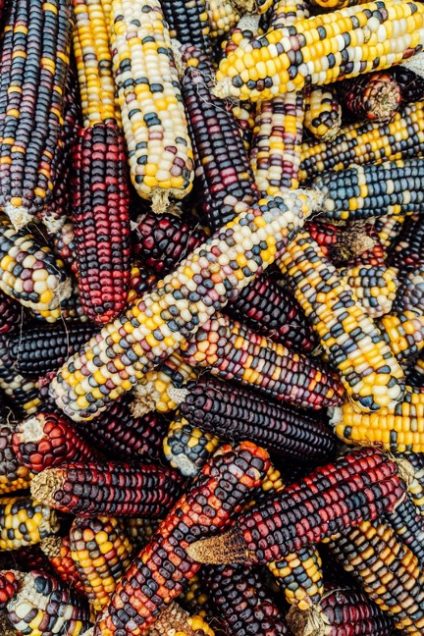
In Indigenous America, food is not extracted, it is gifted. The practice of hunting, fishing, planting, harvesting, preparing, preserving, and consuming are all done in relation to the land and all that live on it and within it. These relationships are central to cultural identity and the breakdown of traditional structures, institutions, and families through physical and political violence imposed by colonialism still has lasting effects. In order to understand the state of indigenous health in America and the ongoing fights for rights and sovereignty, foundational knowledge of how tribal nations came in contact with and responded to colonialism is critical and the intention is to provide that context.
This course explores the relationship between the dispossession and disconnection of land, language, and culture, and the disparate health conditions faced by Indigenous communities today. Our entry point to understanding will be through food and how it relates to not only cultural preservation and revitalization but also the alarming disparities in food-related chronic diseases and the political, structural, and economic drivers that contribute to this health crisis. In this process, we will have nuanced conversations that include, but are not limited to; Indigenous worldviews, traditional foods, food and land policy; water rights; and advocacy and allyship.
In recognition that Native Americans are not a monolithic group and that indigenous study is place-based, we will explore how various communities across Turtle Island have been working to restore and revitalize traditional foods and foodways and how that relates to the modern American food system and food movements. This course honors multiple ways of knowing, learning, and understanding that will guide our learning experience. By the end of the semester, students will know how to thoughtfully support, engage with, and work alongside indigenous communities, organizations, and scholars in their work.
Indigenous Food Cultures and Communities (MET ML 610 A1, fall 2022) will meet on campus on Tuesday evenings, 6:00 pm to 8:45 pm, starting on September 6. This 4-credit course is open to graduate students and advanced undergraduates. Non-degree students may also register. Registration information can be found here.
Another Misguided Diet Trend Debunked
We continue our series of posts from student's in MET ML 619, The Science of Food and Cooking, with Professor Valerie Ryan, with this entry from gastronomy student Adrian Bresler.
We owe a lot to scientists who cure diseases, increase crop yields and even fly us to the moon. But scientists do not always get it right. One clear example is related to their unyielding certainty surrounding the impact of dietary fat and cholesterol on health and mortality in the US in the mid to late 20th century. Here are the facts: Anti-fat sentiment began in full force in the US in the 1980s and continued through the 1990s in response to a number of scientific studies identifying American high fat diets as the main cause of heart disease and the rise in obesity (Johns and Oppenheimer 2018). Fueled by government agency recommendations, widespread coverage by the media, and increased public interest, food companies were only too happy to launch significant numbers of new low fat and nonfat versions of products heretofore available only in their original ‘full fat’ forms.
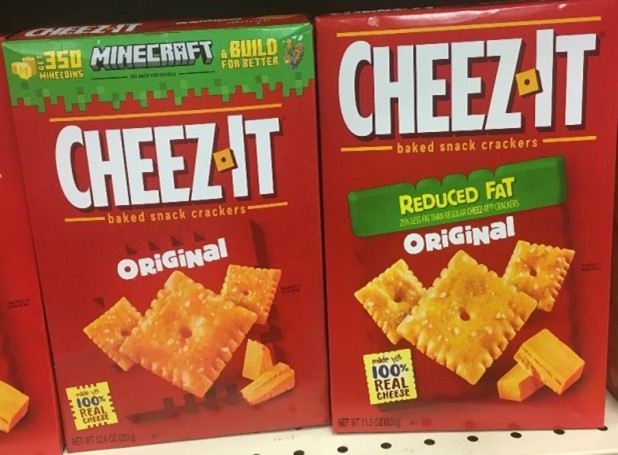
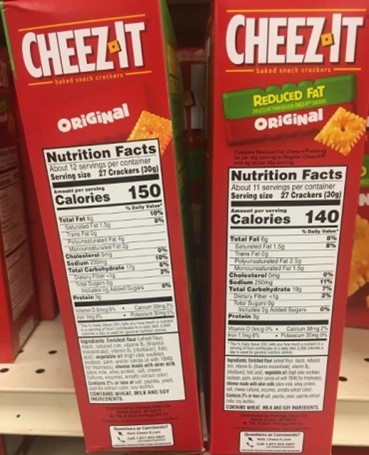
Knowing that the new low fat variants also needed to taste good in order to be acceptable to the American consumer, in spite of the removal of some or all of the fat content, manufacturers found that they needed to substitute or add ingredient(s) that could either mimic the taste of fat or provide mechanisms for making the product taste more palatable (Colla, Costanzo and Gamlath 2018). The answer often relied on an increase in sugars in various forms. Moreover, the food industry invested heavily in Research & Development, leading to the discovery of new ingredients never before consumed by humans, or resulting in the introduction of new methods used in food processing that could deliver on the promise to reduce all fats, regardless of type, from diets. These replacements would come in the form of carbohydrates, fats and protein (Frankel Cardiovascular Center 2020).
One of the simplest methods for reducing unwanted fat from baking recipes was to substitute carbs for fats. Replacements were not only of increased sugars, but also fruit and vegetable purees, gums and fibers (Hayek and Ibrahim 2013). And while these replacements did not impart all of the characteristics of fats, they could partially replace their texture, mouthfeel, moistures and flavors (Zbikowska and Kowalska 2016). By using carbohydrate replacements, manufacturers could also claim the advantage of using “naturally occurring ingredients” despite a similar calorie load to the full fat product. This “natural” substitution had the support of many cookbook authors and magazine writers who provided home cooks with recipes that cut out or reduced fats and instead incorporated purees, often apple or banana. In spite of the scientific studies that showed mixed results in taste tests involving the use of fruit/vegetable purees in baked products, the promised health benefits often outweighed the lack of enthusiasm; for example, cookies, biscuits and crackers were more tolerable to consumers while cakes seemed to turn rubbery and hard (Colla, Costanzo and Gamlath 2018). The most acceptable versions of the recipes were a combination of purees and a reduced amount of fats (Colla, Costanzo and Gamlath 2018).
In fact, my favorite banana bread recipe from the 1990s called for applesauce instead of butter or oil. The only fat in the recipe came from the yolk of one egg. My children loved it—perhaps it was the generous amount of sugar that made it popular, certainly not the banana bread’s texture which resembled that of an eraser after a day or so.
One of the more controversial examples of fat substitutes was a fat-based product, Olestra, developed by Proctor & Gamble (P&G) and introduced to the public in the late 1990s as a core ingredient in ‘Wow’ chips. The fat normally found in snack foods was replaced by a newly laboratory-developed substance: sucrose molecules bound with eight fatty acids—constituting molecules too large to be absorbed through the intestine which therefore contributed no calories to the body (Bimal and Guonong 2006). Unfortunately, the severe gastrointestinal distress they caused, as well as the corresponding loss of fat soluble vitamins required that P&G place a warning label on all bags of Wow chips (Nestle 2013). What started as a promising new tool in the fight against dietary fat became a case study for business school students. Few countries permitted the sale of Olestra as a food additive. Wow chips are no longer sold anywhere.

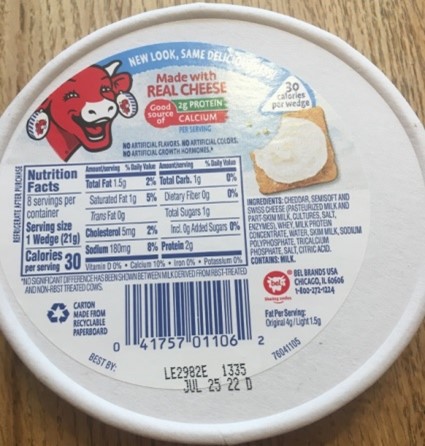
Compare that to the third method of fat substitution: one centered around protein-based products. The best example: Simplesse. Developed by a subsidiary of Monsanto as a fat replacement, Simplesse is a low-calorie whey protein (or egg white protein) concentrate introduced in 1988 that is still found in many products (Widder 1988). A stroll down the dairy aisle of a supermarket today will reveal a myriad of low fat and nonfat cottage cheeses, spreadable cheeses, ice creams and yogurts that contain the whey protein additive. The minute particles of whey proteins create the mouthfeel of fat by giving a creaminess to these products that was lost when the original fat was removed (Marcus 2013). The substitution of whey protein for fat translates to an 85% reduction in calories per gram of ingredient (Haddix 1988). A shortcoming: the additive can only be used in uncooked food. Cooking the whey protein denatures the protein and causes it to coagulate. This has not stopped Simplesse from becoming quite successful; try to find a full fat yogurt in the dairy case. Not so easy.

To get a better understanding of the impact of these new foods on the American diet, I spoke with nutritionist and registered dietitian Elyse Sosin, who has over forty years of experience advising and teaching adults and children about nutritional health in NYC. She began by describing the overwhelming influence the low-fat/no fat diet craze had in the late 1980s. Eating full fat or high cholesterol products bore a stigma. For example, Sosin distinctly remembers that, at the beginning of her career, the mere act of selecting a plate of eggs in the hospital cafeteria where she worked caused her to be scolded by a colleague, “I can’t believe you’re a nutritionist and you are eating that!” And, she said, despite the encouragement by professionals writing newspaper columns and magazine articles supporting this behavior, the lack of fat and the inclusion of higher levels of sugar in processed foods left some people feeling hungry –a real setup for weight loss failure. Through the years she has seen the diet rules change from very low-fat to no-saturated-fat to no-trans-fat to the current rallying cry of low-carb by diet gurus. These diet regimens, Sosin believes, that declare a particular food or category of food ‘bad’ are often too rigid and can lead to their abandonment on the part of those people following the advice of practitioners and trying to maintain a healthy weight and lifestyle.
Even the Food Pyramid, a presentation of healthy food groups introduced here by the US Department of Agriculture in 1992, placed complex carbohydrates (bread, pasta, rice, cereal) at the bottom or base, suggesting that people consume 6 to 11 servings per day (Sosin 2022). As a result, the meat and dairy industries suffered. Fats and oils were at the top along with sweets; these were the ‘bad’ foods to be eaten sparingly.
So despite the minority of skeptics who questioned the validity of the causal relationship of dietary fat and cholesterol on heart disease and the impact of encouraging millions of people to eat more low fat/no fat snacks by promising them ultimate weight loss, newspapers, magazines and the airwaves flooded consumers with advice about fat avoidance (La Berge 2008). Did the introduction of these low fat, no fat products improve the diet and overall health of Americans? Our diet was and is too high in fat. And, according to CDC statistics, approximately 15% of the US adult population was obese in 1980; by the early 2000s that figure rose to over 30% of US adults (Ogden and Carroll 2010). And by 2018, over 40% (Sosin 2022). Heart disease is still the leading cause of death in the US. There is no shortage of possible contributing factors: genetics, sedentary lifestyle, abundance of cheap processed foods, environmental toxins, food deserts, computer games, television, celebrities that promote questionable products, local customs and traditions, ethnic background, government regulations and subsidies. The list goes on and on. Therefore, we understand that neither a quick fix nor a single recommendation exists that will address all of these issues. But the answers will come from those scientists, in a multitude of disciplines, who will need to get it right next time.
Works Cited:
Bimal, Chitrakar & Guonong, Zhang. 2006. Olestra: A Solution to Food Fat? Food Reviews International, 22(3), 245–258.
Colla, Costanzo, A., & Gamlath, S. 2018. Fat Replacers in Baked Food Products. Foods, 7(12), 192.
Frankel Cardiovascular Center, University of Michigan. 2020. Date of access 3/5/2022.
https://www.umcvc.org/health-library/uq1419
Haddix, Carol. February 4, 1988. Chicago Tribune. “That Phenomenon Simplesse ‘Supplies the Feeling of Fat’”.
Hayek, Saeed and Ibrahim, Salam A. 2013. Consumer acceptability of chocolate chip cookies using applesauce as a fat (butter) substitute. Emirates Journal of Food and Agriculture, 25(3), 159.
Johns, David Merritt, and Gerald M. Oppenheimer. 2018. "Was there ever really a “sugar conspiracy”?." Science 359, no. 6377: 747-750.
La Berge, Ann F. 2008. How the Ideology of Low Fat Conquered America, Journal of the History of Medicine and Allied Sciences, Volume 63, Issue 2, April 2008, Pages 139–177.
Marcus, Jacqueline. 2013. Culinary Nutrition: The Science and Practice of Healthy Cooking. Academic Press.
McGee, Harold. 2004. On food and cooking: the science and lore of the kitchen. New York: Scribner.
Nestle. Marion. 2013. Food politics : how the food industry influences nutrition and health (Revised and expanded 10th anniversary ed..). University of California Press.
Ogden, Cynthia and Carroll, Margaret. 2010. Prevalence of Overweight, Obesity and Extreme Obesity Among Adults, Trends 1960-1962 through 2007-2008. Center for Disease Control, Division of Health and Nutrition Examination Surveys.
Sosin, Elyse. 2022. Oral Interview, March 10, 2022.
Widder, Pat. January 28, 1988. Chicago Tribune. “Firm Takes Guilt from Fat”.
Żbikowska, & Kowalska, M. 2016. The use of apple fiber as a fat substitute in the manufacture of bakery products. Journal of Food Processing and Preservation, 41(6), e13241–n/a.
